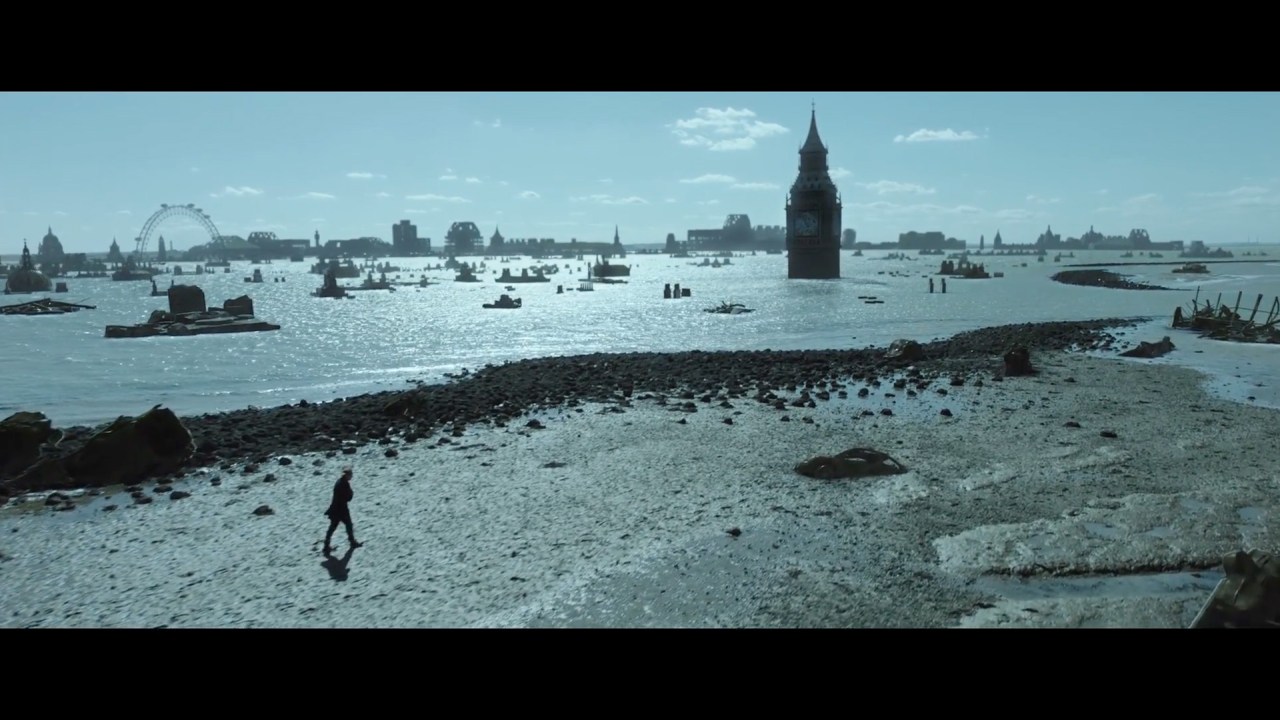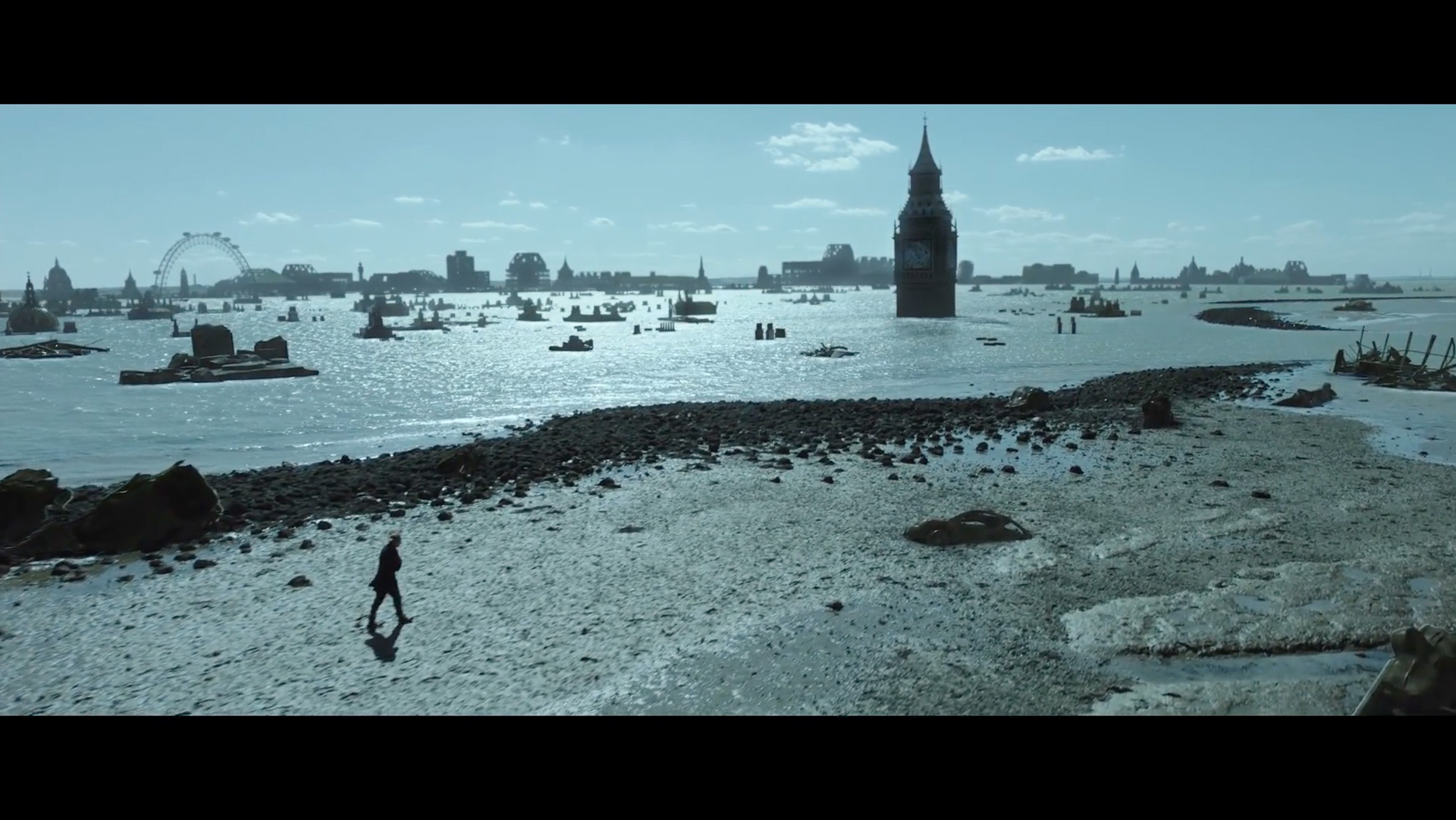Is there a movie that perfectly fits the moment we are in? I finally discovered it: Paul Franklin’s ‘The Escape’ from 2017, based on Robert Sheckley’s famous sci-fi short story ‘Store of the Worlds’ (1958). Although only 16 minutes long, the movie is done very professionally, with well-known actors (Julian Sands, Olivia Williams) in the central roles.
Sheckley’s story begins in what appears to be a destitute suburb of one of our megalopolises: ‘Mr. Wayne came to the end of the long, shoulder-high mound of gray rubble, and there was the Store of the Worlds. It was exactly as his friends had described; a small shack constructed of bits of lumber, parts of cars, a piece of galvanized iron, and a few rows of crumbling bricks.’ The eccentric old man who owns the store explains to Wayne what he is selling: in exchange for all their earthly possessions, he transposes his customers into an alternate reality where they can live according to their most intimate wishes. Wayne cannot decide to accept the offer or not, and the owner tells him to take time and think.
All the way home, Wayne continues to dwell upon the choice, and even afterwards, when immersed in daily life, the idea of going back to the Store and making a decision is always at the back of his mind; time passes like this, till he hears the owner’s voice gently awakening him and asking him if the experience was satisfactory. Wayne puts on the table all his earthly possessions – a pair of army boots, a knife, two coils of copper wire, and three small cans of corned beef – leaves the Store and hurries down to the end of the lane of grey rubble: ‘Beyond it, as far as he could see, lay fields of rubble, brown and grey and black. Those fields, stretching to every horizon, were made of the twisted corpses of cities, the shattered remnants of trees, and the fine white ash that once was human flesh and bone.’
The short movie follows the story with some minor changes, but it keeps its basic twist: the travel back home and the return to ordinary life (haunted by the store owner’s offer) was already the actualisation of Wayne’s desire; his reality is a miserable post-apocalyptic world where he lost everything. One can easily imagine the story transposed into today’s corona epidemic: Wayne steps into the Store, an ultra-clean lab where one is obliged to wear a mask, hears the offer, returns home to his ordinary pre-pandemic life, then awakens and leaves the Store, and we notice that streets are empty and the few people he meets all wear masks and other protective shields.
While our situation is not as dire, we are today in a similar predicament: our world is shattered, and we dream not about some eccentric paradise (or hell) but about a return to normal social life without lockdowns, masks, and constant fear of contagion. The situation is messy, there are so many unknowns – no wonder we are prone to oscillate from one extreme to another. Till a week or two ago, we in Europe were obsessively following the rules of self-isolation. Then something changed in the attitude of many people. Now the threat is taken much less seriously, and we circulate around without masks even if the numbers are not much better. (Maybe this opening is sustained by a desperate wager: the second wave of infections could be even worse, so let’s enjoy a little bit of life while we can.) What we can be sure of is that the consequences of the pandemic for our mental well-being will be heavy: ‘As many as 75,000 Americans could die because of drug or alcohol misuse and suicide as a result of the coronavirus pandemic, according to an analysis conducted by the national public health group Well Being Trust.’
We often read about how difficult it is to properly mourn for all those who are dying now, known and unknown to us, when the usual funeral rituals are not possible. But is there not another, more basic, mourning pervading our social space: what we are really mourning is the abrupt end of an entire way of life. More precisely, we are not even ready to mourn this loss, we remain stuck in melancholy because the old external reality is still here – closed stores and restaurants, cinemas and theatres – but we cannot use any of it properly.
Our problem today is to reinvent our desires. At the moment we cannot even organise the coordinates of our desires. Like Wayne in the story, we desire to regain desire itself, the open situation of desiring. In this mess, a store of the worlds is already open since we all know we will have to do something and reinvent a new world. Trump is offering one world: the same old world of economic prosperity – if we are ready to pay the price of many deaths. China is offering another world of the total control of the state over individuals. But instead of looking around in this store, we have to find strength and turn to reality. Georgi Marinov paints a dark but convincing picture of our near future:
‘To avoid collapse of the social order, measures such as universal basic income, suspending rents, mortgages, debt payments and so on, nationalization of privatized components of the health systems and a number of other key industries, centralized governmental control of production and distribution of food, etc. will be needed.’
This list can be supplemented. For example, the maximum isolation of workers in essential sectors (agriculture, energy, water supply, etc.) is needed to ensure their normal functioning. There is currently no food crisis, but if the virus spreads to rural areas and the planting, growing and harvesting of crops are disrupted, such a crisis will occur. As for the health measures, we should get ready for repeated long strict quarantines. But the economy cannot sustain it, people will say. Here, we should ask for more precision: which economy? It is the global capitalist economy demanding permanent self-expansion which cannot sustain it, the economy obsessed with rates of growth and profitability: ‘The instinct to “not hurt the economy” brought us a ruined economy and a virus that has now spread everywhere, which will be very difficult to eradicate.’ So we have to change our entire perspective: forget the car industry, fashion products, holidays in distant countries, we should calmly let all this fall apart, and employ those who work there half-time elsewhere. We should search for an economy which can also function when a society presses the pause-button and has to live in a prolonged standstill, where just the basics of life are provided.
The new world will have to be a kind of communism in the sense of Marx’s well-known slogan: ‘From each according to his ability, to each according to his needs.’ Are we not already moving towards this point? Not, of course, in the way that Marx imagined it: a society of affluence where everybody has a good life and works creatively. It will be a much more modest world in which everybody will be provided with healthcare and enough food to satisfy his basic needs, and everybody will have to contribute to society (accept being mobilized for harvesting, etc.) according to his abilities. Such a modest world can still be very satisfying spiritually and emotionally.
So download Franklin’s ‘The Escape’ and use it to begin to think what kind of a world we should build on the (social and health) ruins of the pandemic.







Comments